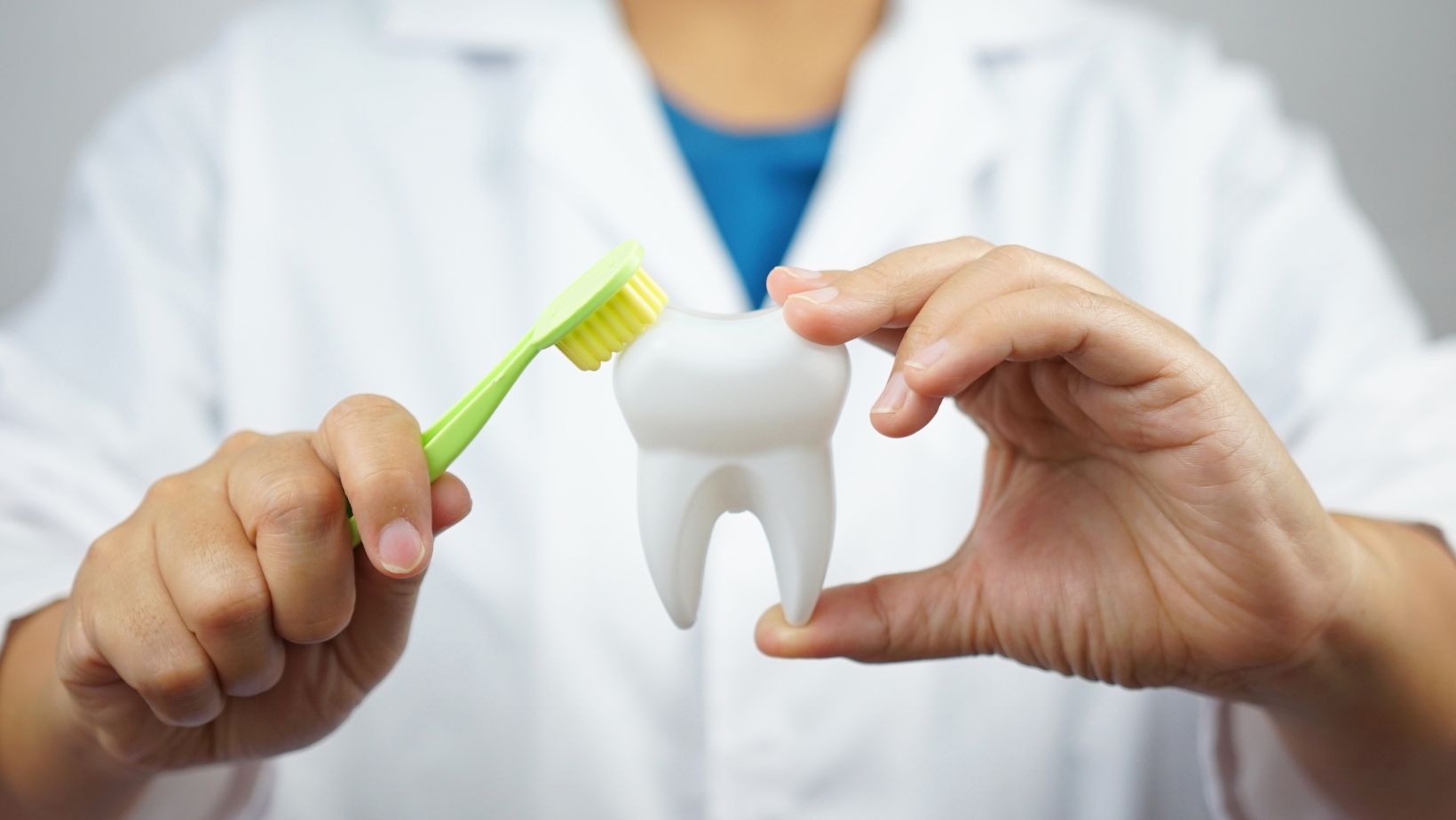Curious about why your teeth are so damaged when you think you’re taking good care of them?
Nearly 50% of adults report stress is affecting their behavior in a negative way. But what a lot of people don’t understand is…
Your mouth is the #1 place stress physically shows up in your body. And it’s doing way more damage than you realize.
Stress is more than just a psychological problem. It’s destroying your oral health in ways most dentists simply don’t see. That’s where holistic health comes in. This method is exactly what people with stress-related dental issues need.
What you’ll discover:
- What Happens in Your Mouth When You’re Stressed
- The Secret Connection Between Your Oral Health and Mental Health
- 7 Real Ways to Reverse Stress Damage
- Your Stress-Free Teeth Care Routine
What Happens in Your Mouth When You’re Stressed
Your stress is literally working against your dental health 24/7.
When your body is in fight-or-flight mode, your mouth is severely affected. This stress response causes a series of events.
Your immune system gets compromised, so you’re less able to fight the bacteria in your mouth that lead to gum disease and decay. Saliva production is inhibited and you are less able to wash away the bacteria.
But that’s not the worst part…
Stress causes you to grind your teeth together.
Research shows stress and anxiety are the cause of nearly 70% of teeth grinding cases. And when you grind your teeth, it will ruin them in ways you could never imagine.
Just one thing to think about…
When you sleep, it’s not uncommon to clench down with up to 250 pounds of force. It’s similar to a heavyweight fighter punching your teeth on the inside.
This adds up fast. So now you’re left with:
- Cracked and chipped teeth
- Abraded enamel
- Jaw pain and headaches
- Temporomandibular joint (TMJ) disorders
And this is the kicker…
You probably won’t even realize you’re doing it until it’s already too late.
The Secret Connection Between Your Oral Health and Mental Health
Did you know…
Your oral health is more connected to your mental health than you realize. Stress shows up in your mouth first.
As your stress hormones flood your system, your whole body is reacting. This includes your teeth.
Cortisol suppresses your immune system, so your oral health is less able to fight inflammation and bacteria. This makes you more likely to experience:
- Swollen and bleeding gums
- Oral infections
- Prolonged healing after dental work
- Cavity development
But the connection doesn’t stop there.
When you’re stressed, you are more likely to make bad lifestyle decisions. This also includes the teeth and can lead to:
- Neglecting your regular brushing and flossing
- Comfort eating (aka sugary foods)
- Smoking and drinking more
- Putting off dental visits
This leads to a vicious cycle. Stress leads to more oral health problems, which causes more stress.
You must have a solution that’s addressing your oral health AND the underlying stress that’s causing it. That’s why it’s important to find an expert dental team that can manage your dental health and needs.
7 Real Ways to Reverse Stress Damage
Want to stop the stress damage to your teeth cycle?
The solutions that work best include combining traditional dentistry and a holistic approach to look at your whole well-being.
Stress Management
The starting point for a holistic approach is learning to manage stress.
These methods have been proven to reduce grinding and protect your teeth:
Mindfulness and Meditation
Meditating just 10 minutes a day can help significantly reduce stress hormones. Cortisol levels go down, your immune system can be more effective, and your mouth becomes more protected from bacteria and inflammation.
Deep Breathing
Simple breathing techniques activate your parasympathetic nervous system and help your body to move away from fight-or-flight mode. The muscle tension that leads to clenching is also reduced.
Progressive Muscle Relaxation
A progressive muscle relaxation technique where you tense and relax each muscle group has been proven to be effective at relaxing tight jaw muscles and reducing nighttime grinding.
Nutrition Support for Teeth
It’s common knowledge that sugar causes decay. But it’s not just sugary foods that can cause damage. When you combine stress with poor nutrition, it leads to increased teeth damage.
Eat foods that help your body deal with stress and inflammation.
- Include omega-3 fatty acids found in fish, nuts, and seeds. As well as dark leafy greens and berries.
- Magnesium, B-vitamins, and vitamin C will help your body to more effectively manage stress and support your oral health.
- Stay hydrated to make sure your saliva flow is helping to defend your mouth from bacteria.
Physical Treatment
In some cases, you will need some physical treatment and relief while working on your long-term stress management:
Custom Night Guard
Talk to your dentist about getting a custom-fitted night guard for while you sleep. This will prevent damage from grinding while you work on stress management. They are a lot more comfortable than the over-the-counter solutions.
Jaw Exercises and Stretches
Simple exercises and stretches can help to loosen tight jaw muscles and increase blood flow in the area.
Warm Compress
Warm compresses applied to jaw muscles before bed will help them to relax and make it easier to control nighttime clenching.
Your Stress-Free Teeth Care Routine
A great routine that supports your mental and oral health can be simple.
Morning Routine:
Get your day off to a calm start with some gentle jaw stretches and mindful breathing while you brush your teeth.

This will help to put you in a more calm mindset and you’ll become more aware of any jaw tension during the day.
Day Time Routine:
Set a reminder to check in on your jaw muscle tension. Are you clenching? Pause and take a deep breath to consciously relax.
Night Time Routine:
Implement stress reduction techniques before you go to sleep. Try using a warm compress on your jaw muscles. Try to get off any screens for at least an hour before you go to bed.
Weekly Habits:
- Keep up with regular dental check-ups to nip problems in the bud.
- Longer stress reduction sessions like yoga and meditation can really help.
- Check in on your diet and make changes to help with both stress management and oral health.
The most important thing is to be consistent. The little things you do every day compound and add up to massive improvements over time.
Wrapping It Up
Stress and your teeth are closely linked but it doesn’t have to control your life.
By understanding how stress is impacting your oral health and implementing holistic solutions, you can protect your teeth and improve your well-being. The best approach is to include:
- Stress management techniques that can help you to manage the problem at the source.
- Nutritional support to help your body’s natural healing processes.
- Physical treatment to prevent immediate teeth damage.
- A simple routine that helps to look after both your mental and oral health.
Your mouth is the reflection of what’s going on in your body. Manage your stress and you are protecting your teeth. Look after your oral health and you are supporting your overall well-being.
It’s never too late to turn things around. But the longer you leave it, the more damage that is done. Try these holistic solutions for stress relief in your mouth now and give your teeth the care it needs.
A critical step in dealing with stress-related damage, like teeth grinding, is getting immediate professional help. To find a specialist who can provide custom solutions like a night guard or restorative treatment, you can search for phrases like dentist Valley Stream or dentist near me to find a local expert who can help protect your smile.
